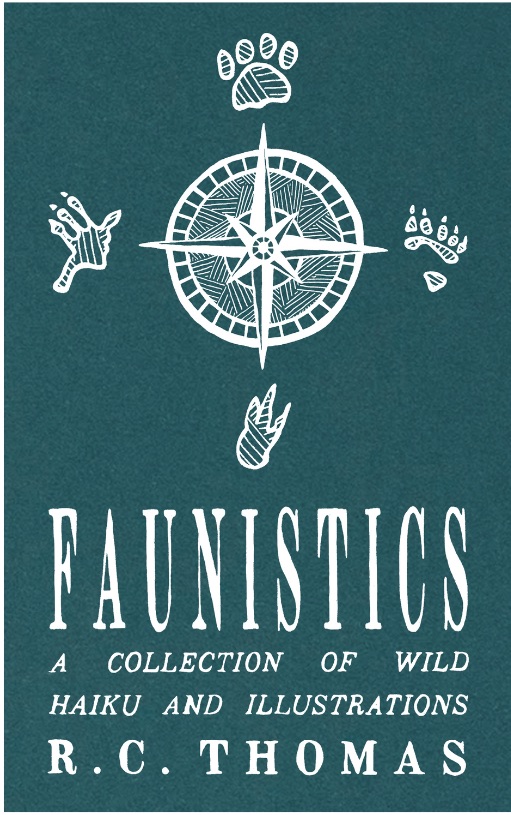
In Praise Of… Faunistics: A Collection of Wild Haiku and Illustrations
R.C. Thomas’ new collection of 140 haiku Faunistics is divided, by continent, into seven geographical sections. Each of these sections contains an engaging selection of haiku, all of which are directly related to Thomas’ chosen theme – the world’s fauna.
At a pivotal moment in the planet’s history, when habitat degradation and loss are driving multiple species toward extinction, it is useful to be reminded of the abundance of Earth’s fauna.
In both style and compass Thomas demonstrates a subtle modernity – there are city foxes, sledge dogs, a dodo’s skin in a shoe box. His poems are steeped in the nature-tradition of the haiku world.
Thomas takes fleeting moments and breaks them into striking concrete images:
white wheat heads sway
the farm cat’s
long whiskers
The impression of the glimpsed cat is deftly rendered and the alliteration helps to unify the image without being intrusive. Perhaps Thomas’ interest in longer poems has helped to hone this skill. The observations throughout are keen and acute. I particularly enjoyed the following two haiku:
lightning flash —
the lace web spider
covers its mealsun glitter
dispersing
sardines
The brevity of the latter focuses the image, the scene is sharp and visible to the reader. The effects of climate change are felt across the continents. In Namibia rhinos dwell upon a watering hole that has been ‘parched for days’; in Texas longhorns lick dew during a drought; in the southern ocean a seal pup bobs in cracked ice. The overall impression is one of awe. Thomas doesn’t fall into the trap of being ‘preachy’. He delivers his message with subtlety, showing us over the 135 pages of his collection, what an abundance of life our small blue dot supports. He shows us the diversity of our planet’s fauna, and incidentally its flora. The two combine magically in my favourite poem of the collection:
winter moving
moss spores
on each millipede leg
The microscopic attention to detail works magnificently and the sense of momentum is palpable. I particularly like how Thomas deals with both macrocosm and microcosm in an eight word haiku. The seasons are moving – winter is clearly transitioning into spring. This seasonal shift is then shown at a microscopic level with the moss spores adhering to the legs of the millipede. Thomas could have chosen a bee and pollen but the millipede is less obvious, and for this reader, a more interesting choice. Faunistics is mainly comprised of three line haiku and monoku. Of the monoku, the shortest are most successful. This monoku, sited in the Bahamas, had particular resonance —
every journey a song a dolphin clicks
In addition to three-liners and monoku Thomas occasionally adds a variant. This eight line (one word per line) poem is clearly informed by the haiku tradition and also plays with the concrete. The form, for me, mimics a column of ash,
volcano
rabbit
on
the
verge
of
historic
ash
In Faunistics Thomas has produced a unique collection. He takes us on a wild trip that reminds us of the interconnected beauty that we are so lucky to be both surrounded by and a part of. The illustrations (also by Thomas) add to the whole and are appealingly quirky. There are many haiku that I will dwell upon in this enchanting collection. I’m delighted to have had the opportunity to review it.
Alan Peat is an English author and haiku poet. His haiku first appeared in ‘Blithe Spirit’ in 1997 and his tanka first appeared in the international tanka anthology, ‘In the ship’s wake’ (Iron Press 2000). He was also joint winner of the 2023 Time Haiku ekphrastic haibun contest. A collaborative collection of surreal haibun, Barking At The Coming Rain, (Alba Publishing) written with Réka Nyitrai was also published in 2023.
Alan has judged numerous international poetry contests including the Sharpening the Green Pencil Internatiinal Haiku contest (2022), KM100NZ international haiku competition (2023) & The Haiku Poets of North California International Tanka contest (2023).
